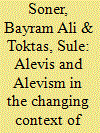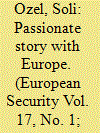| Srl | Item |
| 1 |
ID:
108462


|
|
|
|
|
| Publication |
2011.
|
| Summary/Abstract |
The Justice and Development Party (JDP, Adalet ve Kalk?nma Partisi) has launched a rapprochement policy toward the Alevis. The JDP's Alevi Opening has presented a unique case in Turkey's latest identity politics not only because Alevi claims, for the first time, came to be involved in political processes for official recognition and accommodation, but also because the process was handled by a political party which is regarded to have retained Islamist roots in Sunni interpretation. This article explores the JDP's Alevi Opening process and tries to explain the motivations behind the party's decision to incorporate the Alevi question in its political agenda. What is more, the debate that the opening has caused is also under scrutiny with the positions and arguments held by the actors and the agencies involved in the process, e.g., the Alevis (the secularist and the conservative wings), the General Directorate of Religious Affairs, the National Security Council, the JDP leadership and the Islamist intellectuals.
|
|
|
|
|
|
|
|
|
|
|
|
|
|
|
|
| 2 |
ID:
099489


|
|
|
|
|
| Publication |
2010.
|
| Summary/Abstract |
This article critically evaluates the writings of two well-known intellectuals, Ismay?l Hakk? Baltac?ogbrevelu (1886-1978) and Vacirclacirc Nureddin (Vacirc-Nucirc) (1901-1967), and seeks to assess the implications of social constructionism and biological essentialism for the formation of Republican woman's identity as presented in the works of these authors respectively. The central aim of the article is to reveal and re-appraise the patriarchal mentality underlying Turkish political and social thought by examining the connections between social constructionism and essentialism, as two main factors reinforcing gender inequality in the context of Turkish modernization and the nation-building process. Firstly, it is argued that the works of both authors reflect the dominant gender structure in Turkey, grounded on the subordinate position of women. Despite their divergent positions, neither of the authors provides openings for gender equality. Baltac?ogbrevelu advocates social constructionism emphasizing the socio-cultural at the expense of the natural during the identity formation process while Nureddin supports a biologically essentialist world view based on the "allotted" nature of the female. Baltac?ogbrevelu's social constructionism leads to gender (in)equality based on "sameness," within the contours of the public life whereas biological essentialism of Vacirc-Nucirc, signifies an ontological rejection of gender equality. Secondly, it is argued that both of the authors adopt a functionalist perspective emphasizing the reproductive function of women for men, family and nation and approach the issue of woman's identity within framework of the tradition-modernity continuum.
|
|
|
|
|
|
|
|
|
|
|
|
|
|
|
|
| 3 |
ID:
105396


|
|
|
| 4 |
ID:
085457


|
|
|
|
|
| Publication |
2008.
|
| Summary/Abstract |
Turkey-EU relations have a long and complicated history burdened with respective images about one another. On several dimensions though the completion of these relations through membership of Turkey in the EU is of immense importance. Already the Caucasus crisis has shown what a resurgent and resentful Russia may mean for European security. Efforts to keep Turkey at bay by proposing a Mediterranean union or suggestions of a 'privileged partnership' are unlikely to succeed. To better understand how membership will transform Turkey's politics and in what ways this will benefit the EU one must look at the interface between Turkey's domestic transformation of the past three decades and the changing international environment.
|
|
|
|
|
|
|
|
|
|
|
|
|
|
|
|
| 5 |
ID:
105677


|
|
|
|
|
| Publication |
2011.
|
| Summary/Abstract |
The story of the army's role in Turkish politics between the 1920s and the 1950s is here divided into three phases. During the first phase, between 1923 and 1926, Atatürk succeeded in establishing his personal dominance over the political system by overcoming challenges to his authority by several of his fellow military commanders. After 1926, the army's loyalty to the regime was secured, and it played an important role in Atatürk's nation-building program. This period of symbiosis between the military and the political regime lasted until 1950, when the victory of the Democrat Party opened up a third phase, culminating in the coup d'état of May 27, 1960.
|
|
|
|
|
|
|
|
|
|
|
|
|
|
|
|